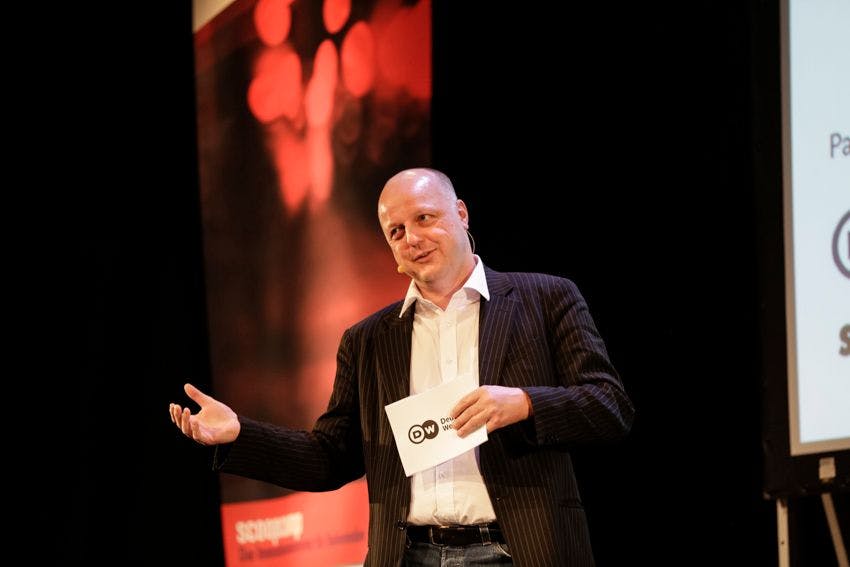New Storytelling and the Future of Journalism at Scoopcamp 2013
,On 12 and 13 September, German press agency dpa and media network Hamburg@work hosted scoopcamp 2013 in the Schmidt theatre on Hamburg’s Reeperbahn. Around 280 people attended the event which focused on topics such as the current status and future of journalism, and new forms of storytelling. A key aspect of presentations and discussions was the disruptions as well as opportunities brought about by digitisation. The Deutsche Welle Innovations Team took a very active role in the event.
The conference
The conference part was moderated by Jochen Spangenberg of DW's Innovation Team. After introductions by Meinolf Ellers (dpa) and Dr. Carsten Brosda, responsible for media policy in Hamburg, it saw four keynote presentations.
Novel forms of collaboration
It started off with Charles Lewis, a former ABC and CBS NEWS 60 Minutes producer and investigative reporter for 30 years, who is currently Professor and Founding Executive Editor of the Investigative Reporting Workshop at American University.
He spoke about the difficulties of investigative reporting these days and the fact that time and money spent on it has been in decline steadily over the past years. One way out of this dilemma, according to Lewis, is universities and non-profit organisations playing a more active role when it comes to uncovering stories that otherwise would have been untold. Another important aspect: collaboration on various levels, Lewis resumed.
Going digital
Next came Nicholas White, founder and CEO of the news website "The Daily Dot". His take: journalists do not own their products any more. A story is never finished–it lives and thrives as a result of user interaction. This happens on various platforms, which all need to be taken into consideration and catered for, according to White. Journalists as well as (old and established) media organisations need to take on board the changes brought about by digitisation. Otherwise, they will slowly fade out and certainly lose in significance, postulated White.
Gaming and news
A rather different approach was taken by games consultant and news games developer Tomas Rawlings of Auroch Digital. His stance: if (news) journalists do not incorporate gaming aspects into their storytelling, others will do so. "Or aren't the 200 million gamers that use the gaming platform Steam alone an interesting audience?", Rawlings asked provocatively. One way of bringing news and games together is showcased on gamethenews.net, provided by Auroch Digital. Games provided by the company range from "Narco Guerra" (about the war on drugs) to the situation in Syria with "Endgame Syria". Asked about the future of the industry, Rawlings stated that a gaming desk should be incorporated into every newsroom of the future.
Taking risk
The final presentation of the day came from Michael Maness of the Knight Foundation. Maness put forward a number of challenging propositions, among them the need to be disruptive, to promote and foster young and skilled technologists, and be brave when it comes to trying out new formulae and approaches. The biggest problem of the news industry, according to Maness, is "the lack of transformational leadership that takes risks, that is not afraid of failures."
The workshops
In the afternoon, seven "hands on workshops" took place. One of these was entitled "Lost in the Jungle: Journalistic Research in the Digital Era". It was carried out by Birgit Gray, Kay Macquarrie and Dr. Nicolas Heise of DW's Innovations Team. About 30 participants, many of them from publishing houses, participated. The DW team showcased how content residing in Social Networks can be used for journalistic work such as research, fact checking and topic detection.
The Hackathon
A novelty of the 2013 edition of the scoopcamp was a Hackathon. A day before the main event in Schmidt's Theater, four teams met in various locations across the city to plan, discuss and develop ideas under the header "new storytelling". They had 24 hours to come up with a convincing concept or prototype that would persuade the audience of its value and usefulness. Results were presented in the course of the conference in five-minute elevator pitches. Then, it was time for the audience to cast its vote.
And the winner was... The DW Innovation Team & Friends, headed by DW's Cosmin Cabulea and Andreas Giefer, and further supported by Amelia Wischnewski, Henri-Nannen-Journalistenschule, and developers Jean Vancoppenolle, Ferret Go and Tarn Barford, Retresco. They were awarded the first ever "Scoop 2013". Their project entitled "Know Your Data–Tell Your Story" is the early prototype of an application that allows users to request data from the social networks they use, and then visualize this without sharing that data with other third-parties.
The end
After a final discussion round of Meinolf Ellers with Ulrike Langer in the St. Pauli bar Platzhirsch, it was time to chill, eat, drink exchange thoughts and further ideas before it was time to head home or onwards. An exhausting, but highly rewarding day came to an end. Scoopcamp 2014: we'll be back!
Related links
Below, you find a selection of links about scoopcamp 2013 (all in German language, though):
- Peter Zschunke: Scoopcamp 2013: Journalism meets code meets design meets future
- Fiete Stegers (NDR Zapp): Köpfewaschen beim Scoopcamp
- Christian Fahrenbach (ZDF): Scoopcamp 13: Neue Geschichten von der Reeperbahn
- Next Media Blog: Scoopcamp 2013
- C. Brandes-Visbeck: Spielen mit Peers Finger und der SchlandKette... Unkonventionelle Ideen für zeitgemäßen Journalismus
- Die Welt: Experten raten zu unkonventionellen Wegen im Journalismus
- Beitrag in der 14 Uhr Ausgabe der Tagesschau vom 13.09.2013
- kress.de: Scoopcamp 2013: Die Zukunft des Journalismus führt über Kooperationen
- Sina Gritzuhn (Hamburg@work): Das war das scoopcamp 2013
